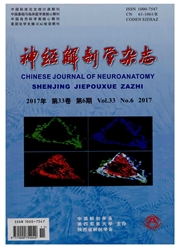

 中文摘要:
中文摘要:
目的:观察异丙酚(propofol,PPF)预处理对心肺复苏后大鼠学习记忆能力的影响以及海马神经元的保护作用。方法:将80只Sprague—Dawley大鼠随机分为正常对照组、复苏+英脱利匹特对照组(R+intralipid)、复苏+异丙酚低剂量预处理组(R+PPF10mg/kg)、复苏+异丙酚高剂量预处理组(R+PPF50mg/kg)。实验组窒息前10min腹腔注射10%异丙酚10mg/kg或50mg/kg。建立大鼠心肺复苏模型,并在复苏后3d进行Morris水迷宫检测大鼠学习记忆能力,海马Nissl染色观察神经元损伤情况,Westernblot检测easpase.3的表达变化。结果:与正常对照组大鼠相比,复苏后大鼠出现明显的学习记忆能力的降低(P〈0.05),异丙酚预处理则能显著改善复苏导致的行为学改变(P〈0.05)。Nissl染色结果表明,心肺复苏后大鼠海马CAl区神经元排列稀疏、紊乱,细胞间隙增大。异丙酚预处理(10mg/kg或50mg/kg)后,神经元的数量和排列模式均有显著改善。Westernblot结果显示心肺复苏后,海马caspase-3的表达显著升高。而异丙酚预处理(10mg/kg或50m.g/kg)组caspase.3的表达与英脱利匹特对照组相比显著降低(P〈0.05)。结论:异丙酚预处理可能通过改善心肺复苏后的神经元损伤而发挥脑保护作用。
 英文摘要:
英文摘要:
Objective: To observe the effect of propofol(PPF) preconditioning on learning and memory ability and the protective effects of (PPF) on hippocampal neurons after cardiopulmonary resuscitation (CPR). Methods: 80 Sprague- Dawley rats were randomly divided into naive group, resuscitation + intralipid control group, resuscitation + propofol I0 mg/kg group, resuscitation + propofol 50 mg/kg group. The experimental group was induced by intraperitonal injection of 10% propofol ( 10 mg/kg or 50 mg/kg) 10 mins before asphyxiation. A rat model of cardiac arrest was established . Three days after resuscitation, animals were tested of spatial learning and memory by Morris Water Maze. At the same time, the surviving neurons in hippocampus were observed by Nissl's staining and the expression of caspase-3 was detec- ted by Western blot. Results : Compared with naive control group, the learning and memory ability of rats with resuscita- tion were decreased significantly (P 〈 0.05), and propofol pretreatment could significantly improved the behavior changes (P 〈0.05). The Nissl's staining showed that the neurons in hippocampus CA1 region were sparsely arranged and had widened intercellular space. Propofol pretreatment ( 10 mg/kg or 50 mg/kg) significantly improved the number of survival neurons and the arrangement form of neurons. Western blot analysis showed that the expression of caspase-3 protein was significantly increased. Compare with intralipid, the expression of the protein caspase-3 was significant reduced (P 〈 0. 05). Conclusions: Propofol preconditioning plays a role in protecting brain by reducing neuronal injury after cardiac arrest and asphyxiation.
 同期刊论文项目
同期刊论文项目
 同项目期刊论文
同项目期刊论文
 期刊信息
期刊信息
